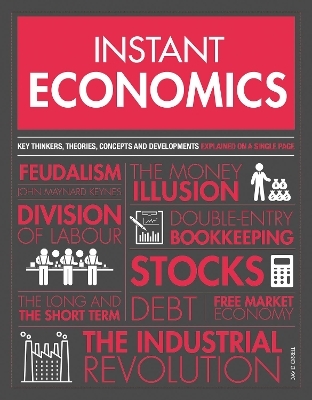
Instant Economics
Welbeck (Verlag)
978-1-78739-419-3 (ISBN)
From Adam Smith to Karl Marx, taxation to debt crisis, and inequality to economic freedom, every key figure, discovery, controversy and concept is explained with succinct and lively text and graphics.
Perfect for the knowledge hungry and time poor, this collection of graphic-led lessons makes economics interesting and accessible. Everything you need to know is here.
David Orrell is an applied mathematician and author of several books on economics, including Introducing Economics: A Graphic Guide, and Behavioural Economics (forthcoming).
Introduction • What is economics? • What does an economist do? • What is wealth? • Ancient economics • Scholastic economics • Feudalism • Islamic economics • Double-entry bookkeeping • Mercantilism • The Industrial Revolution • Adam Smith • The invisible hand • Classical economics • Karl Marx • The marginal revolution • Neoclassical economics • Alfred Marshall • Carl Menger • Marginal productivity • Inflation • Deflation • The money illusion • Rational economic man • The corporation • Preferences • Diminishing marginal utility • Demand • Supply • Elasticities • The law of supply and demand • Equilibrium • Price controls • Indifference curve • Consumer budget • Economic surplus • Deadweight losses • Opportunity cost • Perfect competition • Efficiency • Market failure • Monopoly • Monopsony • Externalities • The Great Depression • Keynes • Propensity • The multiplier • The long and the short term • Neoclassical synthesis • Milton Friedman • Chicago school • The mainstream consensus • The macroeconomy • Investment • Interest rates • Gross domestic product (GDP) • Consumption • Economic growth I - classical theory • Division of labour • Comparative advantage • Thomas Malthus • The steady-state economy • Monetary policy • Bonds • Yield curve • Credit rating • Debt • Taxes • The economics of death • Price index • Negative interest rates • Fiscal policy • Neoliberalism • International trade • Bilateral balances • Development economics • Randomized control trials • Private property • The commons • Markets • Free market economy • Communism • The fall of the Berlin Wall • Mixed economy • The IMF and World Bank • Labour • The role of government • Economic model • William Petty • Laissez-faire economics • Léon Walras • The Pareto principle • The IS-LM model • The Phillips curve • Expected utility theory • Prisoner's dilemma • The Arrow-Debreu model • The representative agent • DSGE model • Econometrics • The unpredictable economy • Integrated climate-economy models • History of money • The two sides of money • Tally sticks • Gold and silver • Paper money • Fiat money • Fractional reserve banking • Central banks • Money creation by banks • Hyperinflation • Debt and deficits • Modern Monetary Theory • Quantitative easing • Basic income • Rates of exchange • The euro • Credit cards • Cryptocurrency • Neoclassical growth model • Creative destruction • The business cycle • Human capital • New Growth Theory • Promoting economic growth • Securities • Stock • Modern portfolio theory • Random walks • Efficient market hypothesis • Options • Hedge funds • Black-Scholes • Derivatives • Value at risk • Financial services industry • The Great Financial Crisis • Post-crisis economics • Behavioural economics • Cognitive biases • Prospect theory • Behavioural finance • Complexity economics • Systems dynamics • Agent-based models • Evolutionary economics • Quantum economics • Land • Inequality • Thomas Piketty • Limits to growth • Climate change economics • Alternatives to GDP • Instability • Hyper-globalization • Power • Gender • Tax evasion • Ethics • Glossary and Further Reading.
| Erscheinungsdatum | 02.07.2021 |
|---|---|
| Zusatzinfo | 250 illus |
| Sprache | englisch |
| Maße | 184 x 234 mm |
| Gewicht | 510 g |
| Themenwelt | Sachbuch/Ratgeber ► Beruf / Finanzen / Recht / Wirtschaft ► Wirtschaft |
| Geschichte ► Teilgebiete der Geschichte ► Wirtschaftsgeschichte | |
| Wirtschaft ► Allgemeines / Lexika | |
| Wirtschaft ► Volkswirtschaftslehre ► Finanzwissenschaft | |
| ISBN-10 | 1-78739-419-0 / 1787394190 |
| ISBN-13 | 978-1-78739-419-3 / 9781787394193 |
| Zustand | Neuware |
| Informationen gemäß Produktsicherheitsverordnung (GPSR) | |
| Haben Sie eine Frage zum Produkt? |
aus dem Bereich


